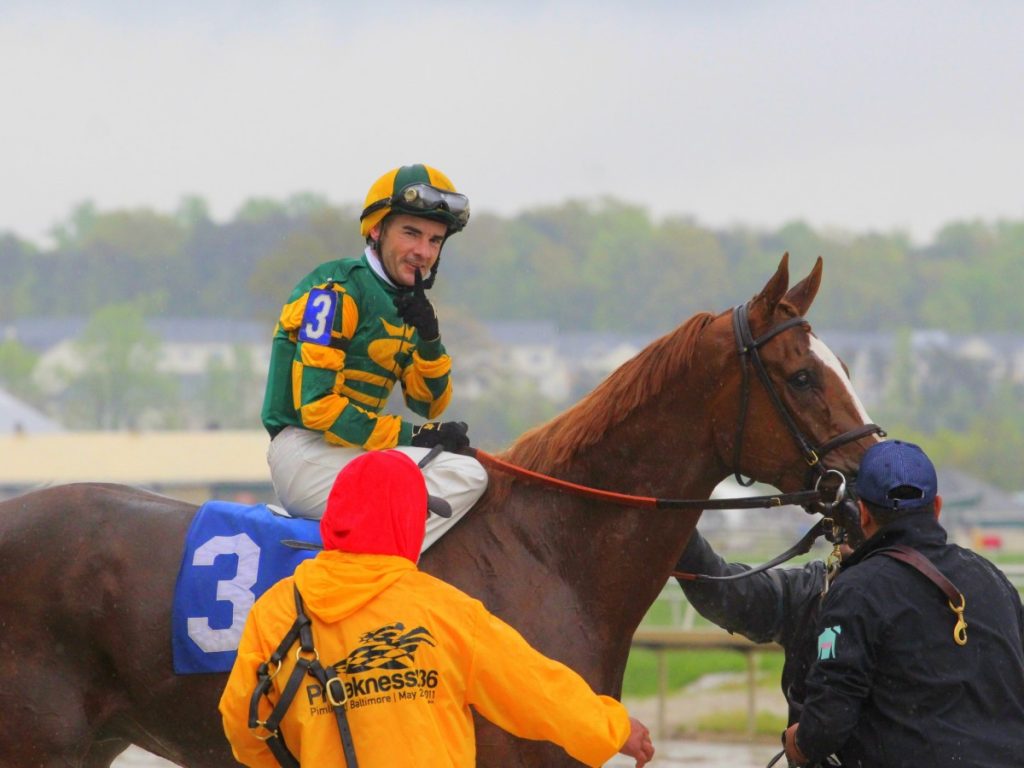Shipping a complicated process – but winning can make it worthwhile

Local jock Feargal Lynch was the beneficiary of Twisted Tom’s shipping in, winning the Tesio Saturday. Photo by Dottie Miller.
by Joe Fonte
To say it’s been a banner year for horses shipping into Maryland probably would be an understatement.
Saturday at Laurel Park, three of the five stakes were won by New York-based shippers, with runners from the powerful barns of Todd Pletcher and Chad Brown taking the two biggest races. Pletcher’s improving Lights of Medina secured a two-length win in the $125,000 Weber City Miss, while Brown’s Twisted Tom won his second consecutive Maryland stake in the $125,000 Federico Tesio, for three-year-olds. Another New Yorker, Charlton Baker, sent out Absatootly to win the $75,000 Primonetta Stakes.
And that’s to say nothing of trainer Linda Rice, who despite shipping in horses from her New York base to Laurel, rates a chance to win the meet’s training title. She has 20 victories during the stand, five fewer than meet leader Kieron Magee, and is winning at a 50 percent clip.
All that shipping, however, leads to challenges for a variety of people at the races.
Keith Feustle creates the morning line for all of Maryland racing. He is tasked with giving the racing fans a professional opinion of how the betting public (around the country and the world) will likely wager. He knows the local Maryland and regional horses very well, and can almost always determine the race favorites and highlight the long shots.
However, on major race days in Maryland, Feustle has to analyze how horses from around the country will be wagered on. He points out that there is a difference if a New York trainer uses a local jockey, or if he or she brings a favorite jockey down to ride.
“Certainly trainers like Todd Pletcher and Chad Brown are going to merit a little more attention, because they are going to attract the New York money,” Feustle explained. “We have seen that same situation with Linda Rice’s horses as well. Laurel Park has always been known to have a pretty fair racing surface, so I do not think that horses shipping in are at a disadvantage – as opposed to some of the other mid-Atlantic race tracks. The turf course is great, and the dirt course is very fair, so shippers tend to do very well here.”
Of course, shipping doesn’t just pose issues for the linemaker.
It turns out that the process of shipping any horse (anywhere) is quite involved. Stable Manager Terry Overmier takes care of most of the horses shipping in. For her and and stakes coordinator Coley Blind, no detail is too minor to merit their attention, and the same holds true for Francisco Saez, who coordinates the accommodations for the grooms and hot walkers.
For example, trainer Todd Pletcher, who also sent Action Everyday to Laurel to a third-place finish in the Tesio, likes to send his horses a day or two early and they stay in the Gaudet barn. Linda Rice, Chad Brown and John Servis, on the other hand, send their horses on the morning of the race. Overmier makes sure that all of the horses have their normal bedding, coordinates how many handlers each horse has with them, and she and Blind make sure that all of the trainers are taken care of.
“When we are looking to find the best horses for our major races, we look at all of the horses from the East Coast (north and south), and the Midwest or anywhere else in the country. We review the past performances of every horse that may possibly be attracted to one of our races, then we contact the connections to make sure that they consider running their horse here in Maryland in one of our races,” Blind added.
Track announcer Dave Rodman, a long-time veteran of the game, has to be aware of newcomers at all times.,
“I basically just watch them when they warm up, and I recognize most of our local horses’ colors,” Rodman said. “I just make sure that I pay attention before the race, and I normally never have a problem.”
When Rice ships in, it’s veteran Maryland trainer Damon Dilodivico who saddles her horses for her. Saturday, he legged up Cornelio Velasquez aboard favored Carradine in the Tesio. While Dilodovico, who’s having a strong year in his own right, has had plenty of pictures taken this year with Rice horses, that would not be the case in the Tesio, as Carradine finished fourth. Fortunately, Dilodivico said, “All of her horses are well behaved in the paddock and are very professional in their races.”
For the ship-in jocks and trainers, the whole process makes for a long day.
Jockey Cornelio Velasquez said that he left New York around 7 a.m. and would not get back home until 9 or 10 p.m. tonight. He will then get up around 6 a.m. and start all over again. He won on one of his six Laurel mounts Saturday, taking a maiden claiming race aboard Acoustic. Sunday he was scheduled on five more mounts back home at Aqueduct.
William H Wolfendale III has been training horses for almost 50 years. He said his normal day begins around 5:00 a.m. every morning. He trains his horses in Maryland. Then he goes home, cleans up and returns to saddle his horses at Laurel Park. If he has a horse that is shipping to, say, Charles Town Races, he has to coordinate a van driver and an assistant to get his horse to West Virginia two hours before the race.
“If we win or come in second in a late race, it could be another hour or two before we head back to our barn in Maryland,” he said.
On the other hand, that win makes the trip all the more bearable.








